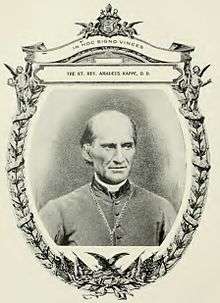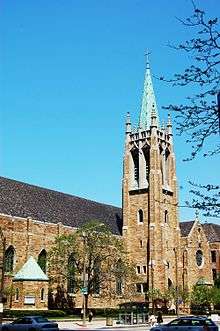Louis Amadeus Rappe
Louis Amadeus Rappe (February 2, 1801 – August 9, 1877) was a French-born bishop of the Roman Catholic Church. He served as Roman Catholic Bishop of Cleveland from 1847 to 1870.
Louis Amadeus Rappe | |
|---|---|
| Bishop emertus of Cleveland | |
 | |
| Church | Roman Catholic Church |
| Archdiocese | Cincinnati |
| Diocese | Cleveland |
| See | Cleveland |
| In office | October 10, 1847–August 22, 1870 |
| Predecessor | Office Created |
| Successor | Richard Gilmour |
| Orders | |
| Ordination | March 14, 1829 by Hugues de la Tour d'Auvergne-Lauragais |
| Consecration | October 10, 1847 by John Baptist Purcell |
| Personal details | |
| Born | February 2, 1801 Audrehem, Pas-de-Calais, France |
| Died | August 9, 1877 (aged 76) St. Albans (town), Vermont, USA |
| Buried | Cathedral Resurrection Chapel |
| Nationality | French |
| Previous post | Priest of the Diocese of Cincinnati (1839–1847); Priest of the Diocese of Boulogne (1829–1839) |
| Motto | In hoc signo vinces |
Biography
The son of peasants, Rappe was born in Audrehem, Pas-de-Calais, to Eloi and Marie Antoinette (née Noël) Rappe. He was one of ten children and labored in the fields until October 1820, when he entered the College of Boulogne (then under Benoit Haffreingue). After graduating in 1826, Rappe entered the seminary of Arras and was later ordained to the priesthood by Bishop (later Cardinal) Hugues de la Tour d'Auvergne-Lauragais on March 14, 1829.[1] He then served as pastor of Wismes until 1834, when he became chaplain to the Ursuline monastery in Boulogne.[2]
Pastor
In 1839 he accepted an invitation from Bishop John Baptist Purcell to join the Diocese of Cincinnati, Ohio, in the United States, arriving there in October 1840.[2] He was sent to Chillicothe to learn English from the scholar, William Marshall Anderson. Purcell named him pastor of St. Francis de Sales Parish in Toledo.[3] Rappe ministered to the Catholic laborers on the Miami and Erie Canal and the settlers along the Maumee River; his unofficial parish limits extended from Toledo to the Indiana border and as far south as Allen County.[4] He was a strong temperance advocate. To educate the children of his flock, he established a branch of the School Sisters of Notre Dame, building a convent and school for them.[2] Having hitherto labored by himself, he eventually received the Rev. Louis De Goesbriand as an assistant in 1846.[4]
Bishop

On April 23, 1847, Rappe was appointed the first bishop of the newly created Diocese of Cleveland by Pope Pius IX. He received his episcopal consecration on the following October 10 from Bishop Purcell, with Bishop Richard Vincent Whelan serving as a co-consecrator, at Cincinnati.[1] Two days after his consecration, he published his first pastoral letter, in which he expressed his desire "to be regarded as your friend and father, rather than your superior."[2] At that time, the diocese contained 42 churches and 21 priests; the first and only Catholic church in Cleveland was St. Mary's on the Flats.[5] He soon established the city's first parochial school, which doubled as a chapel.[4]

Rappe purchased an episcopal residence in 1848, and also laid the cornerstone of the new St. John's Cathedral on October 22 of that year. He founded a seminary at his residence that year as well. In 1849 he went to Europe to recruit clergy for the diocese, returning in 1850 with four priests, five seminarians, two Sisters of Charity and six Ursuline nuns.[2] The Daughters of the Immaculate Heart of Mary opened St. Mary's Orphan Asylum for Females in 1851. The Sisters of Charity opened St. Vincent's Asylum for Boys in 1852.[6]
Rappe consecrated St. John's Cathedral on November 7, 1852, and, a hospital being badly needed due to the Civil War, established St. Vincent Charity Hospital in 1865.[7] He also introduced into the diocese the Grey Nuns (1856), the Good Shepherd Sisters (1869), the Little Sisters of the Poor (1870), the Friars Minor (1867) and the Jesuits (1869),[2] and organized the Sisters of Charity of St. Augustine as a new congregation.[8] Rappe eventually met strong opposition. His eyesight began to fail, and upon returning from the First Vatican Council he resigned as bishop on August 22, 1870.[1]
He left the diocese with more than 100,000 Catholics, 107 priests, 160 churches, and 90 schools. He spent the next seven years at St. Albans (town), Vermont, attending to the missions in Vermont and Canada.[4] He was later offered another diocese, but declined.[2] He died at St. Albans on September 8, 1877, at the age of 76 and was buried in St. John's Cathedral in Cleveland.
References
- "Bishop Louis Amadeus Rappe". Catholic-Hierarchy.org.
- Houck, George Francis (1887). The Church in Northern Ohio and in the Diocese of Cleveland from 1749 to 1890. Short & Forman.
- "Rappe, Louis Amadeus", The Encyclopedia of Cleveland History
- Clarke, Richard Henry. Lives of the Deceased Bishops of the Catholic Church in the United States.
- "ST. MARY'S ON-THE-FLATS". Encyclopedia of Cleveland History | Case Western Reserve University. 2018-05-22. Retrieved 2020-03-13.
- The National Magazine; A Monthly Journal of American History. 1887.
- "St. Vincent Charity Medical Center". St. Vincent Charity Medical Center>. Retrieved 2020-03-13.
- "Sisters of Charity of St. Augustine", The Catholic Church in the United States of America, Catholic Editing Company, 1914, p. 86

External links
| Catholic Church titles | ||
|---|---|---|
| New title Newly-erected |
Roman Catholic Bishop of Cleveland 1847–1870 |
Succeeded by Richard Gilmour |
